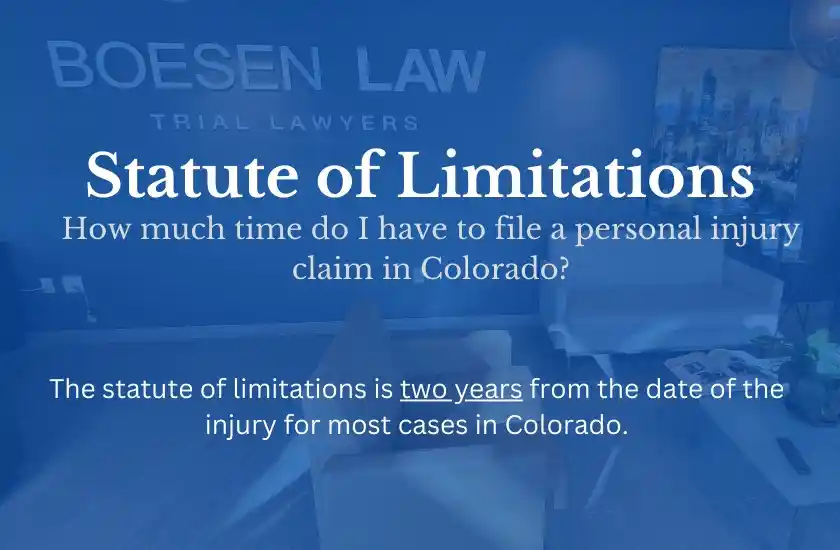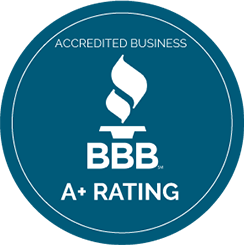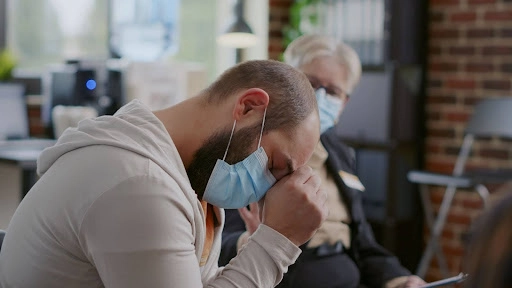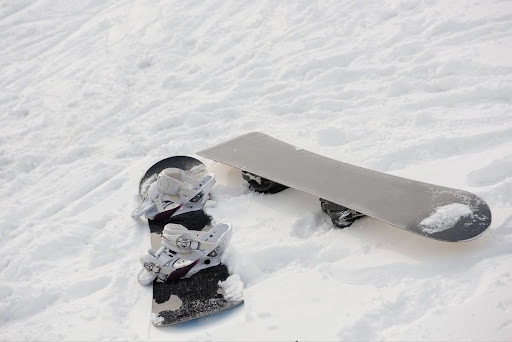Injured in Denver? Our Personal Injury Attorneys Are Here to Fight for You.
At Boesen Law, we represent injury victims throughout Denver and across Colorado. Whether you were hurt in a car crash, a slip-and-fall, or due to medical negligence, our personal injury lawyers are here to fight for the justice and compensation you deserve. We know the legal process can feel overwhelming — and we’re here to guide you through every step.
Boesen Law Client Testimonials
Watch our past clients share how we helped them with their injury cases and their experience with our Denver personal injury law firm.
Reach out to our law firm for a no-cost, no-obligation consultation today. Call our personal injury lawyers in the state of Colorado at (303) 999-9999 or contact us online.
Do I Have a Personal Injury Case in Denver?
One of the most common questions we receive is whether a client has a personal injury case. First, let’s define what qualifies as a personal injury.
What is Personal Injury?
In the state of Colorado, a personal injury is defined as any harm suffered by an individual as a result of another’s negligence, carelessness, or intentional actions. This harm can manifest physically, emotionally, or psychologically, covering a wide range of incidents from automobile accidents and workplace injuries to slip-and-fall accidents and medical malpractice.
So do you have a case? Here is what a law firm must prove in order to win your case and get financial compensation:
- The other person had a duty to be careful. This means they had a responsibility to act reasonably and avoid harming others. In legal terms, it’s known as duty of care.
- They failed in that duty. They did something wrong or careless that a reasonable person wouldn’t have done. In legal terms, this is known as a breach of duty of care.
- Their actions directly caused your injuries. You wouldn’t have been hurt if they hadn’t acted negligently. This is called causation.
- You suffered real harm because of it. These are compensable losses suffered by the plaintiff – the main reason for the personal injury claim. This includes things like medical bills, lost income, and pain and suffering.
It’s important to remember: We need to show it’s “more likely than not” that the other person is responsible. Think of it as tipping the scales of justice slightly in your favor. If you’ve been injured in an accident in Denver, a local personal injury attorney can help you gather the evidence you need to build a strong case.
Our Denver personal injury lawyers play a crucial role in assisting injury victims to understand the breadth of what constitutes a personal injury and in providing the legal expertise required to pursue justice and compensation for their suffering and losses.
How Our Denver Personal Injury Lawyers Can Help You
Recovering from a personal injury can be overwhelming, but having the right legal team on your side makes all the difference. At Boesen Law, we provide more than just legal representation—we offer comprehensive support to help you navigate the complexities of your case and secure the compensation you deserve.
Here’s how we can assist you:
- Thorough Investigation – We carefully review your case, gathering crucial evidence such as accident reports, medical records, and witness statements to build a strong claim.
- Strategic Legal Approach – Every case is unique. Our attorneys develop a personalized strategy focused on achieving the best possible outcome for you.
- Strong Documentation – From medical bills to expert testimony, we ensure all necessary documents are properly organized to support your case.
- Negotiation & Advocacy – We handle negotiations with insurance companies and opposing parties to fight for a fair settlement, ensuring you’re not undervalued or dismissed.
At Boesen Law, we are committed to protecting your rights and guiding you through the legal process every step of the way. Let us help you get the justice and compensation you deserve. Contact us today for a free consultation.
When Should I Hire a Personal Injury Lawyer?
If you’ve been injured and you’re unsure whether you need legal help, here are five signs it’s time to contact an attorney:
- You have serious injuries or long-term medical needs
- The insurance company is denying or undervaluing your claim
- There are multiple parties involved (like in a pileup or multi-property accident)
- You’re unsure who is at fault
- You’re overwhelmed by paperwork or deadlines
Even if you’re not sure you want to file a claim, speaking with a Denver personal injury attorney at Boesen Law can give you peace of mind and clarity on your rights.
Avoid These Common Mistakes After a Personal Injury
Even well-meaning actions can hurt your case. Here’s what not to do after an accident:
- Talking to the at-fault party’s insurance without a lawyer
- Delaying medical care or follow-up treatment
- Posting on social media about the incident
- Not tracking your symptoms, pain, or emotional state
- Waiting too long to contact an attorney
The sooner you get legal support, the better your chances of protecting your health, your claim, and your financial future.
What to Expect During Your Personal Injury Case
Every personal injury case is different, but here’s a general timeline of what to expect when you work with Boesen Law:
- Free Case Review: We learn about your accident and assess your potential claim.
- Investigation: We gather evidence, request records, and consult experts.
- Demand Letter: Once we understand your damages, we send a demand to the insurance company.
- Negotiation: We fight for a fair settlement — and push back if it’s too low.
- Litigation (if needed): If a fair offer isn’t made, we file a lawsuit and prepare for trial.
Most of our clients never have to set foot in court — but we’re fully prepared to go the distance if that’s what it takes to win your case.
Types of Personal Injury Claims
There are three main categories of personal injury claims, each requiring a different legal approach:
Negligence Claims
Negligence claims occur when someone fails to act with reasonable care, causing harm to another person. Examples include car accidents caused by distracted driving or slip-and-fall incidents due to unsafe conditions on a property.
Strict Liability Claims
Strict liability applies when a person or company is held responsible for injuries, regardless of intent or negligence. This is common in cases involving defective products or dog bites in Colorado. In these claims, the injured party only needs to prove the injury occurred, not that the defendant acted negligently.
Intentional Harm Claims
Intentional harm claims involve deliberate actions, such as assault or battery, that directly cause injury to another person. In these cases, the responsible party intentionally inflicts harm, and the injury victim may seek compensation for the damages resulting from these actions.
How to Build a Strong Personal Injury Case in Colorado
Successfully pursuing a personal injury claim in Colorado requires strong evidence and a clear legal strategy. To maximize your chances of securing compensation, you must establish key elements that demonstrate the validity of your case. Here’s what you need to focus on:
- Establishing Duty of Care – Show that the at-fault party had a legal obligation to act responsibly and avoid causing harm.
- Proving a Breach of Duty – Provide evidence that the responsible party failed to meet this duty, whether through negligence, recklessness, or wrongful actions.
- Linking the Breach to Your Injuries – Demonstrate that the defendant’s actions directly caused your injuries and losses.
- Documenting Damages – Collect clear proof of medical expenses, lost wages, pain and suffering, and other financial or emotional impacts.
Building a strong case requires thorough investigation, legal expertise, and skilled negotiation—especially when dealing with insurance companies. Our experienced personal injury attorneys are here to guide you through every step, ensuring you receive the compensation you deserve.
Types of Personal Injury Cases We Handle
We have decades of experience in representing clients who were injured in an accident across a diverse spectrum of personal injury cases, including:
We handle many more types of serious injuries, such as wrongful death lawsuits and truck accident litigation. To view more, take a look at our Practice Areas. Our team is ready to hear the specific circumstances surrounding your case and provide recommendations.
Steps to Take After a Personal Injury
After suffering a personal injury, the actions you take can significantly impact your recovery and legal case. To protect your rights and strengthen your claim, follow these key steps:
- Prioritize Your Health – Seek medical attention as soon as possible, even if your injuries seem minor. Some conditions worsen over time, and having medical records will be crucial for your case.
- Report the Injury – Notify the appropriate party based on where the injury occurred. Whether it’s law enforcement, an employer, or a property owner, having an official report can serve as valuable evidence.
- Gather and Preserve Evidence – Take photos or videos of your injuries, the surroundings, and any contributing hazards. Keep records of medical expenses, accident reports, and any related documentation.
- Document Your Experience – Maintain a journal detailing your pain levels, emotional struggles, and how the injury affects your daily life. This can help demonstrate the full impact of your injuries.
- Be Cautious with Insurance Companies – Insurers often aim to minimize payouts. Avoid providing recorded statements or signing anything without legal guidance.
- Consult a Personal Injury Attorney – An experienced lawyer can evaluate your case, handle negotiations, and ensure you receive the full compensation you deserve.
What to Avoid After a Personal Injury
Taking the right steps after a personal injury is crucial, but avoiding certain mistakes can be just as important. Here are key things to avoid to protect your claim:
- Do Not Admit Fault – Avoid taking blame at the scene or when speaking with insurance adjusters. Fault is determined through evidence, not personal statements.
- Limit What You Say – While you should report the injury, avoid making detailed statements to insurance companies without legal guidance. Anything you say could be used to reduce your claim.
- Don’t Accept a Quick Settlement – Insurance companies often offer low settlements early on. These may not cover all your medical expenses, lost wages, or long-term damages. Consult an attorney before accepting any offer.
- Avoid Delaying Medical Treatment – Waiting too long to seek medical care can not only harm your health but also weaken your case. Insurance companies may argue your injuries weren’t serious.
- Don’t Post on Social Media – Anything you share online can be used against you. Avoid posting about your injury, activities, or case details.
Navigating a personal injury claim can be complex, but avoiding these common mistakes will help protect your rights. Contact Boesen Law today to discuss your case and ensure you receive the compensation you deserve.
Statute of Limitations for Personal Injury Cases
If you suffered an accident resulting in injuries or property damages, we suggest you consult with a personal injury attorney at Boesen Law as soon as possible because there are specific time limits to fill your personal injury claim.
For most personal injury claims in Colorado, the statute of limitations is two years from the date of the injury, according to the Colorado Revised Statutes section 13-80-102. This two-year limit typically applies to cases involving injuries caused by someone else’s negligence, such as car accidents, slips and falls, and other common types of personal injury cases. However, there are exceptions depending on the specifics of the case, such as claims against government entities or for injuries that were not discovered immediately.

In cases where the injury was not discovered right away, Colorado law provides that the statute of limitations may begin to run from the date the injury was discovered, or should have been discovered with reasonable diligence.
Understanding Comparative Negligence in Denver
Since Colorado follows a comparative negligence system, explaining this concept can help readers understand how fault is assigned in personal injury claims.
- What is Comparative Negligence? – If a plaintiff is partially at fault for their injuries, their compensation is reduced by their percentage of fault.
- How It Affects Your Claim – For example, if someone is 20% at fault for a car accident but suffers significant injuries, their damages would be reduced by 20%.
- Why It Matters – Understanding this legal principle helps clients know how it could impact the final settlement or trial outcome.
This would give readers an essential legal insight into how fault is determined in personal injury cases and why it’s important to have an attorney advocating on their behalf.
How Long Will It Take to Settle My Personal Injury Case?
The timeline for resolving a personal injury case can vary depending on several key factors:
- Severity of Injuries: The more severe your injuries, the longer your recovery and the longer it may take to gather complete medical records. The duration of your recovery can also impact the overall value of your claim.
- Complexity of the Case: Some cases involve complicated legal or factual issues, such as disputes over liability, which can extend the settlement timeline.
- Availability of Evidence: Strong evidence, such as medical records, accident reports, and witness testimony, can expedite the process. However, delays in obtaining this evidence can slow things down.
- Negotiation vs. Trial: If the case can be resolved through negotiation with the insurance company, it may settle more quickly. If negotiations fail and a trial is necessary, the process will take longer.
At Boesen Law, we work diligently to resolve your case as efficiently as possible while ensuring you receive the full compensation you deserve.
Why Personal Injury Cases in Denver Take Time
Many injury victims expect a quick settlement, but several factors can impact the timeline of a Denver personal injury claim:
- Medical Treatment Duration – The full extent of injuries must be assessed before negotiating a fair settlement.
- Insurance Company Tactics – Insurers may delay payments or dispute liability to reduce payouts.
- Court Backlog – If a case goes to trial, it may take longer due to scheduling delays in Denver courts.
Our legal team works diligently to expedite the process while ensuring you receive maximum compensation for your injuries.
Compensation You Can Recover After a Personal Injury in Denver
Following a personal injury, you may be entitled to recover maximum compensation to help ease the burden of your losses. At Boesen Law, we meticulously evaluate all aspects of your case to determine the appropriate amount of compensation that reflects your injuries and losses, including:
- Medical expenses: coverage for all medical treatments, including future medical costs if your injuries require long-term care.
- Lost wages: compensation for any lost earnings as well as diminished earning capacity if you’re unable to return to work at the same capacity.
- Pain and suffering: compensation for physical pain and suffering caused by the accident. These are non-economic damages. These can include emotional distress, mental anguish, loss of consortium, body scarring, inconvenience, or psychological trauma.
- Property damage: reimbursement for repairs or replacement of property damaged during the incident.
Our goal is to ensure you receive all-inclusive maximum compensation that addresses the immediate and ongoing consequences of your injuries, while considering all the associated damages.
Punitive Damages vs. Non-economic Damages
Non-Economic Damages
- Purpose: To compensate the injured party for intangible losses that don’t have a readily quantifiable monetary value.
- Examples: Pain and suffering, emotional distress, loss of enjoyment of life, disfigurement, loss of consortium (intimacy or companionship).
- Calculation: Determined based on the severity of the injury, its impact on the injury victim’s life, and sometimes using a multiplier of the economic damages.
Punitive Damages
- Purpose: To punish the defendant for particularly egregious or malicious conduct, and to deter similar behavior in the future.
- Examples: Awarded in cases involving intentional harm, gross negligence, or reckless disregard for safety.
- Calculation: Based on the defendant’s financial resources and the severity of their misconduct, but often capped by state law.
The Role of Expert Witnesses in Denver Personal Injury Cases
Hiring expert witnesses can add credibility to your claim and maximize your compensation.
Common Expert Witnesses Used in Personal Injury Cases
- Accident Reconstruction Experts – Recreate how the accident happened using forensic evidence.
- Medical Professionals – Provide insights into long-term care needs and expected medical costs.
- Economic Loss Experts – Calculate lost wages and future financial impact.
Having local Denver-based expert witnesses makes a difference in the courtroom and when negotiating with insurance companies.
How Much is Your Case Worth?
Each personal injury case is unique, with its own set of circumstances that affect the potential settlement amount. Boesen Law offers personalized free initial consultations to discuss the specifics of your case and provide a realistic expectation of what you can expect in terms of financial recovery. By evaluating factors such as the severity of your injuries, the impact on your lifestyle, and the negligence involved, we can give you a clearer picture of the potential value of your claim. For instance, a motor vehicle accident case might be worth $1,000,000 whereas a workers compensation settlement or verdict might be worth $500,000. We really don’t know until we understand the extend of your injuries.
Contact a Personal Injury Lawyer in Denver
We invite you to reach out and discuss your case with us at no cost. During your free legal consultation, we will listen to your story, evaluate your case, and advise on the best course of action. Our no-fee promise ensures that you pay nothing unless we win your case.
Let our Denver personal injury attorney take the lead in securing the maximum financial compensation you need to move forward. Please contact us today to learn firsthand how our expert legal representation can play a significant role in your journey toward recovery.

Reach out to our law firm for a no-cost, no-obligation consultation today. Call our personal injury lawyers in the state of Colorado at (303) 999-9999 or contact us online.
Content Reviewed By












